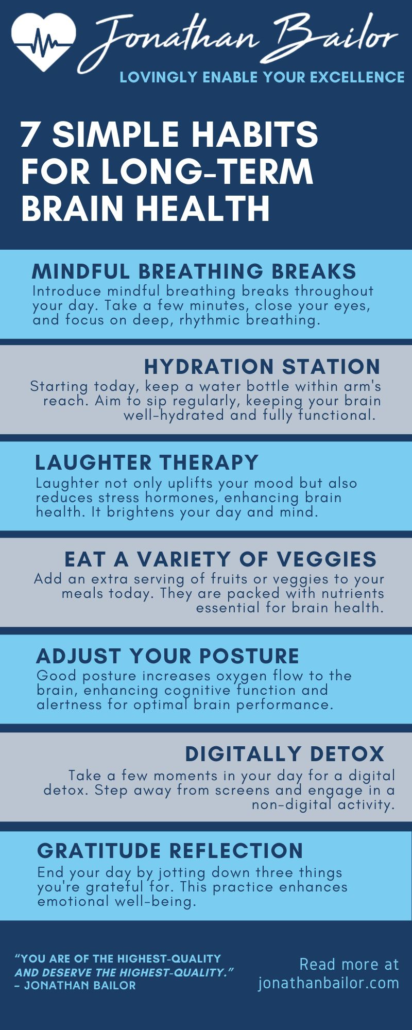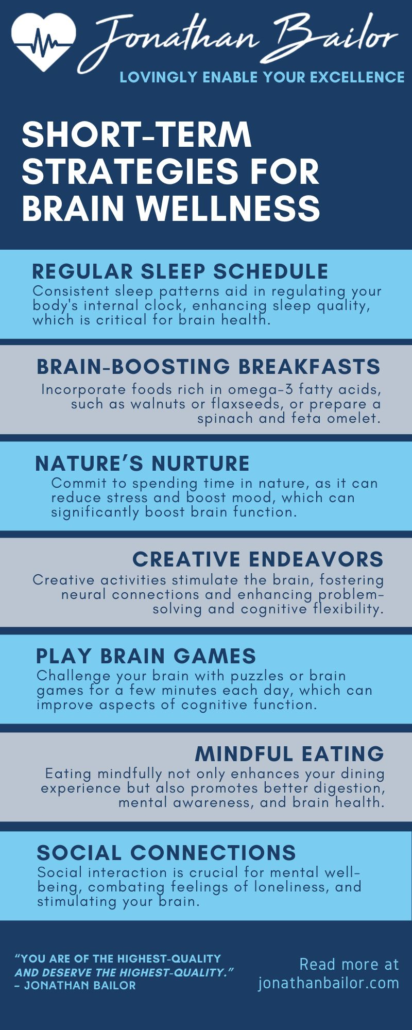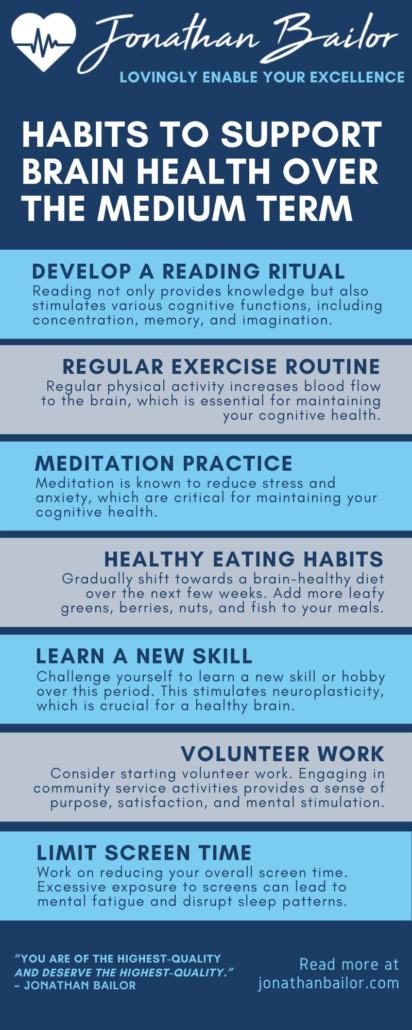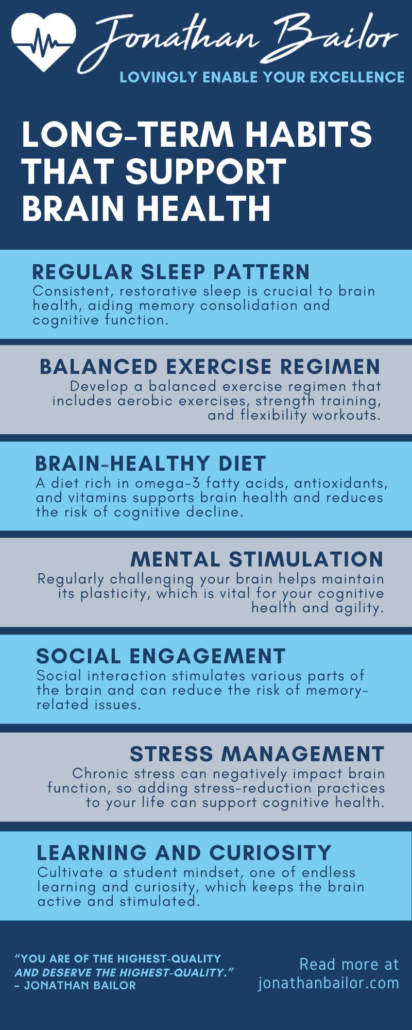28 Daily Habits to Support Long-Term Brain Health at Every Stage
Here are 28 daily habits to support long-term brain health at every stage of life with Jonathan Bailor! As the golden years unfold, nurturing our brain’s health becomes more crucial than ever. Imagine the brain as a vibrant garden, where every thought and memory is a blooming flower and daily habits are the nurturing sun and water. Are you ready to turn a new leaf in your health and wellness story? Dive into this brain health guide with insights from Jonathan Bailor. Here, you’ll discover expert secrets for an even better you. These practices, simple yet profound, can be seamlessly woven into your daily life, holding the key to a sharp, agile mind and enabling you to cherish every moment with clarity and zest.
If you enjoy brain health as much as we do, check out our 7 Best Hobbies for Brain Health and Dry January 2024: 12 Brain Health Benefits of Quitting Alcohol guides next!
This journey towards lifelong brain vitality is not just about scientific strategies; it’s about infusing each day with small, joyful rituals that support our cognitive well-being. Whether it’s the first sip of morning tea, a leisurely stroll in the park, or a heart-to-heart conversation with your best friend, these moments are the building blocks of a robust and resilient mind. Though seemingly small, each habit is a powerful step in safeguarding our mental agility and emotional richness.
In this exploration of brain health, we’re not just focusing on the ‘what’ but also the ‘how’. It’s about embracing practices that resonate with your rhythm and lifestyle. Whether you’re a doting parent, a creative soul, or a community leader, these habits are tailored to blend into your life, enriching your days with mental vitality. They are designed to be as delightful as they are beneficial, transforming mundane routines into moments of mindfulness and self-care.
As you delve into these daily practices, remember that each one is a token of self-love and a tribute to your future self. They are not just steps to prevent cognitive decline but pathways to a richer, more vibrant life experience. So, embark on this journey with a spirit of curiosity and an open heart, ready to discover how simple daily habits can become your allies in nurturing a healthy, vibrant brain at every stage of life.
As you read on, you’ll find these habits are more than just guidelines; they are invitations to a journey of self-discovery and growth. And as you integrate them into your life, may you feel inspired to share this journey with friends and family. Each shared experience becomes a ripple, spreading the message of brain health and holistic well-being. Let’s embark on this journey together, nurturing our minds and inspiring those around us.
Today’s Touchstones: Simple Shifts for Enhanced Brain Health
1. Mindful Breathing Breaks
Amidst the hustle of daily life, our brain often craves a pause. Introduce mindful breathing breaks throughout your day. Take a few minutes, close your eyes, and focus on deep, rhythmic breathing. This practice lowers stress levels and increases blood flow to the brain, offering an instant refresh to your mental state. It’s like a mini-vacation for your mind, accessible anytime and anywhere.
2. Hydration Station
Water is the elixir of life, especially for your brain. Starting today, keep a water bottle within arm’s reach. Aim to sip regularly, keeping your brain well-hydrated. Proper hydration aids in maintaining cognitive functions and concentration levels. Think of it as watering the garden of your mind, keeping it lush and thriving.
3. Laughter Therapy
The joyous act of laughter is a potent brain booster. Find opportunities to laugh, be it a light-hearted chat with a friend, a funny video, or recalling a humorous memory. Laughter not only uplifts your mood but also reduces stress hormones, enhancing brain health. It’s a delightful remedy, brightening your day while invigorating your mind.
4. Colorful Plate, Colorful Mind
Add an extra serving of fruits or vegetables to your meals today. These colorful wonders are packed with antioxidants and nutrients essential for brain health. They combat oxidative stress and inflammation, which are key factors in cognitive decline. It’s a simple change with a colorful impact, nourishing your brain one meal at a time.
5. The Power of Posture
Adjust your posture throughout the day. Sit up straight, relax your shoulders, and take a deep breath. Good posture increases oxygen flow to the brain, enhancing cognitive function and alertness. It’s a small adjustment with a significant impact, aligning your body for optimal brain performance.
6. Digital Detox Moment
Allocate a few moments in your day for a digital detox. Step away from screens and engage in a non-digital activity, like reading a book or engaging in a craft. Reducing screen time, even briefly, can alleviate eye strain and mental fatigue, giving your brain a much-needed respite.
7. Gratitude Reflection
End your day by jotting down three things you’re grateful for. This practice of gratitude fosters positive thinking and also enhances emotional well-being, which is closely linked to cognitive health. It’s a serene moment to appreciate life’s gifts, nurturing a healthy and happy mind.

Feeling Better Is Priceless, That's Why We Don't Put A Price On It!
“It’s Like A Free and Medically Valid Version of Noom and Weight Watchers Online”
~ Dr. Doctor Matthew Oleshiak, MD
Click the 'LEARN MORE' button below for free lifetime access to the fast fix program developed by Jonathan and top Ivy League Medical Doctors
LEARN MOREP.S. It's not a free trial. It's not part of the program for free. The entire program is free, forever, for real! No credit card needed.
Small Steps, Significant Shifts: Short-Term Strategies for Brain Wellness
1. Sleep Schedule Consistency
In the coming days, focus on establishing a consistent sleep schedule. Aim to go to bed and wake up at the same time each day, even on weekends. Consistent sleep patterns aid in regulating your body’s internal clock, enhancing sleep quality, which is critical for brain health. A well-rested brain is more capable of memory retention, problem-solving, and maintaining cognitive sharpness.
2. Brain-Boosting Breakfasts
Start your mornings with a breakfast that includes brain-supporting nutrients. Incorporate foods rich in omega-3 fatty acids, such as walnuts or flaxseeds, or prepare a spinach and feta omelet. These nutrients are vital for brain cell health and cognitive function, setting a positive tone for your brain’s activity throughout the day.
3. Nature’s Nurture
Commit to spending time in nature over the next few days. Whether it’s a leisurely walk in the park, enjoying all the blooming flowers, gardening, or just sitting under a tree, connecting with nature can reduce stress and boost mood, which is beneficial for cognitive function. This natural immersion offers a refreshing change of scenery for your mind, promoting mental clarity and tranquility.
4. Engage in Creative Endeavors
Dedicate some time each day to engage in a creative activity. It could be painting, writing, playing a musical instrument, or any other form of creative expression. Creative activities stimulate the brain, fostering neural connections and enhancing problem-solving and cognitive flexibility.
5. Brain Games Challenge
Challenge your brain with puzzles or brain games for a few minutes each day. Activities like crossword puzzles, Sudoku, or memory games keep the brain engaged and can improve aspects of cognitive function such as problem-solving, memory, and processing speed.
6. Mindful Eating Moments
Practice mindful eating during your meals. Pay attention to the flavors, textures, and sensations of your food. Eating mindfully not only enhances your dining experience but also promotes better digestion and mental awareness, contributing to overall brain health.
7. Social Connection Commitment
Over the next few days, make a conscious effort to connect with friends or family members, whether through a phone call, video chat, or a socially-distanced meet-up. Social interaction is crucial for mental well-being, combating feelings of loneliness, and stimulating your brain through meaningful conversations.

Embarking on a Journey: Fortifying Brain Health Over the Medium Term
1. Develop a Reading Ritual
Over the next few weeks, cultivate the habit of regular reading. Choose books that interest or challenge you, whether they’re novels, non-fiction, or professional literature. Reading not only provides knowledge but also stimulates various cognitive functions, including concentration, memory, and imagination. This mental stimulation keeps your brain active and agile, warding off cognitive decline.
2. Regular Exercise Routine
Commit to a regular exercise routine, incorporating activities like brisk walking, swimming, or yoga. Regular physical activity increases blood flow to the brain, which is essential for maintaining cognitive health. Those who exercise regularly have a reduced risk of developing Alzheimer’s disease or dementia. Aim for at least 150 minutes of moderate aerobic activity weekly. Regular exercise is also known to improve mood and sleep quality, further contributing to overall brain wellness.
3. Meditation Practice
Start a meditation practice, dedicating a few minutes each day to this mindful pursuit. Meditation is known to reduce stress and anxiety, which are critical for maintaining cognitive health. Over weeks, this practice can lead to structural changes in the brain, enhancing areas related to memory, attention, and emotional regulation.
4. Healthy Eating Habits
Gradually shift towards a brain-healthy diet over the next few weeks. Incorporate more leafy greens, berries, nuts, and fish into your meals. These foods are rich in antioxidants, vitamins, and omega-3 fatty acids, which are essential for brain health. Reducing processed foods and sugar will also contribute to better brain function and overall health.
5. Learn a New Skill
Challenge yourself to learn a new skill or hobby over this period. Whether it’s a new language, a musical instrument, or a craft like knitting, learning new skills stimulates neuroplasticity, which is crucial for a healthy and adaptable brain. This process brings a sense of achievement and keeps your brain engaged and youthful.
6. Volunteer Work
Consider starting volunteer work. Engaging in community service activities provides a sense of purpose and satisfaction. It also offers opportunities for social interaction and mental stimulation, both of which are vital for maintaining a healthy and active brain.
7. Limit Screen Time
Over the next few weeks, work on reducing your overall screen time. Excessive exposure to screens can lead to mental fatigue and disrupt sleep patterns. Try to replace some of this time with activities like outdoor walks, board games with family, or other hobbies. This balance is essential for mental well-being and maintaining a healthy, active brain.

Nurturing Lifelong Brain Health: Strategies for the Long Haul
1. Establish a Regular Sleep Pattern
Over the coming months, focus on establishing and maintaining a regular sleep pattern. Aim for 7-9 hours of quality sleep each night. Consistent, restorative sleep is crucial to brain health, aiding memory consolidation and cognitive function. This long-term commitment to good sleep hygiene is foundational to maintaining a sharp, active brain well into the future.
2. Build a Balanced Exercise Regimen
Develop a balanced exercise regimen that includes aerobic exercises, strength training, and flexibility workouts. This not only enhances overall physical health but also promotes neurogenesis—the creation of new brain cells—and supports cognitive function. Incorporating different forms of physical activity over the months will keep your exercise routine engaging and beneficial for your brain.
3. Cultivate a Brain-Healthy Diet
Gradually shift towards brain-healthy foods like leafy greens, fatty fish, nuts, and berries. This change doesn’t need to happen overnight but should be a consistent effort over the months. A diet rich in omega-3 fatty acids, antioxidants, and vitamins supports brain health and reduces the risk of cognitive decline.
4. Regular Mental Stimulation
Commit to ongoing mental stimulation by engaging in activities that challenge your brain. This could include taking courses, attending workshops, or engaging in intellectually stimulating hobbies. Regularly challenging your brain helps maintain its plasticity, which is vital for cognitive health and agility.
5. Social Engagement
Make a long-term commitment to staying socially active. Engaging in regular social activities and maintaining strong relationships contribute significantly to emotional well-being and cognitive health. Social interaction stimulates various parts of the brain and can reduce the risk of memory-related issues.
6. Practice Stress Management
Develop and maintain a stress management routine. Whether through regular meditation, yoga, or other relaxation techniques, managing stress is essential for long-term brain health. Chronic stress can negatively impact brain function, so incorporating stress-reduction practices into your life is a step toward maintaining cognitive health.
7. Continuous Learning and Curiosity
Cultivate a student mindset, one of endless learning and curiosity. Whether it’s through reading, exploring new places, or trying new activities, keeping your mind engaged and curious supports cognitive function and can protect against cognitive decline. This lifelong approach to learning keeps the brain active and stimulated.

Navigating the Wonders of the Brain: Frequently Asked Questions
Q1: What are some natural ways to enhance brain function?
Natural ways to boost brain function include maintaining a healthy diet rich in omega-3 fatty acids, antioxidants, and vitamins in foods like fish, nuts, berries, and leafy greens. Regular physical exercise, especially aerobic activities, enhances blood flow to the brain, supporting cognitive functions. Additionally, engaging in mentally stimulating activities, practicing mindfulness, and ensuring adequate sleep are crucial for optimal brain health.
Q2: How does sleep impact brain health?
Sleep plays a pivotal role in brain health. During sleep, the brain undergoes processes essential for memory consolidation and the removal of toxins accumulated during waking hours. Lack of adequate sleep can impair cognitive functions such as concentration, decision-making, and problem-solving. Consistently getting quality sleep is crucial for long-term brain health and cognitive resilience.
Q3: Can the brain heal itself after an injury?
The brain has a remarkable ability to heal and reorganize itself after an injury, a process known as neuroplasticity. While the extent of recovery depends on the injury’s severity and location, rehabilitation activities like physical therapy, cognitive exercises, and speech therapy can significantly impact recovery. The brain’s adaptability allows it to compensate for lost functions and, to some extent, restore them.
Q4: What role does diet play in maintaining brain health?
Diet plays a significant role in brain health. Consuming a diet high in brain-boosting nutrients like omega-3 fatty acids, antioxidants, and vitamins found in fish, nuts, fruits, and vegetables supports cognitive functions and reduces the risk of cognitive decline. A balanced diet also helps manage blood pressure and cholesterol levels, contributing to overall brain health and decreasing the risk of stroke.
Q5: Is it possible to improve memory?
Yes, it is possible to improve memory. Regular mental stimulation through activities like reading, solving puzzles, and learning new skills enhances memory and cognitive functions. Physical exercise, particularly aerobic activities, increases blood flow to the brain, supporting memory function. Additionally, maintaining a healthy diet, reducing stress, and getting adequate sleep are essential for memory preservation and improvement.
Embracing the Journey: Sharing the Gift of Brain Health
As we conclude this exploration of nurturing our brain’s vitality, remember that the journey towards a healthier mind is one filled with small, impactful steps—each practice, whether immediate or long-term, is a testament to our commitment to holistic well-being. I invite you to share these insights with friends and family, spreading the knowledge across all social media platforms and email. Together, let’s inspire a community-wide movement towards better brain health, one where every small change is celebrated as a step towards a vibrant, mentally enriching life. Your share could be the catalyst for someone’s healthier tomorrow.
Feeling Better Is Priceless, That's Why We Don't Put A Price On It!
“It’s Like A Free and Medically Valid Version of Noom and Weight Watchers Online”
~ Dr. Doctor Matthew Oleshiak, MD
Click the 'LEARN MORE' button below for free lifetime access to the fast fix program developed by Jonathan and top Ivy League Medical Doctors
LEARN MOREP.S. It's not a free trial. It's not part of the program for free. The entire program is free, forever, for real! No credit card needed.




